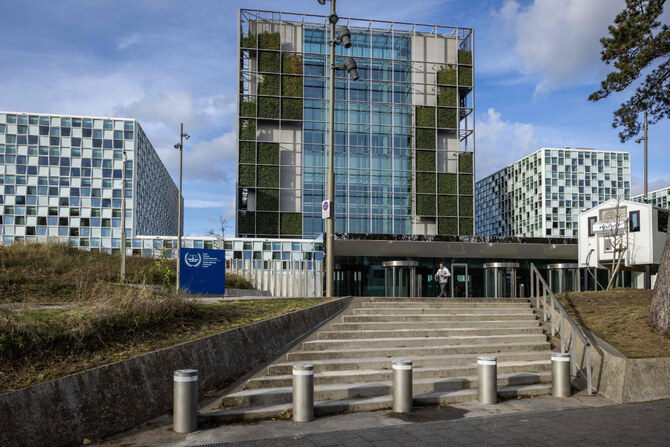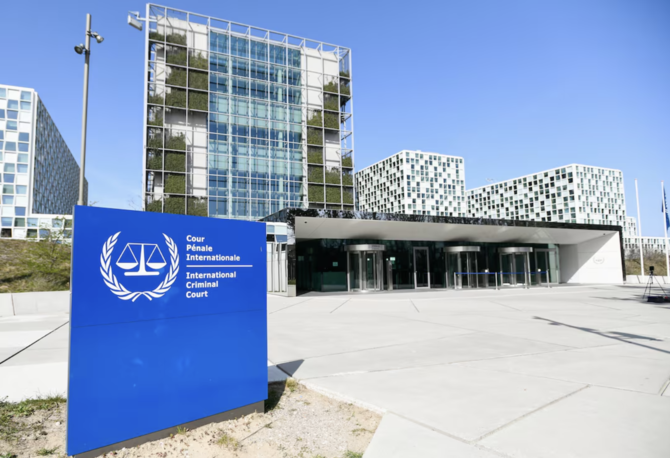WASHINGTON: President Donald Trump on Thursday signed an executive order imposing sanctions on the International Criminal Court over investigations of Israel, a close US ally.
Neither the US nor Israel is a member of or recognizes the court, which has issued an arrest warrant for Israeli Prime Minister Benjamin Netanyahu for alleged war crimes over his military response in Gaza after the Hamas attack against Israel in October 2023. Tens of thousands of Palestinians, including children, have been killed during the Israeli military’s response.
The order Trump signed accuses the ICC of engaging in “illegitimate and baseless actions targeting America and our close ally Israel” and of abusing its power by issuing “baseless arrest warrants” against Netanyahu and his former defense minister, Yoav Gallant.
“The ICC has no jurisdiction over the United States or Israel,” the order states, adding that the court had set a “dangerous precedent” with its actions against both countries.
Trump’s action came as Netanyahu was visiting Washington. He and Trump held talks Tuesday at the White House, and Netanyahu spent some of Thursday meeting with lawmakers on Capitol Hill.
The order says the US will impose “tangible and significant consequences” on those responsible for the ICC’s “transgressions.” Actions may include blocking property and assets and not allowing ICC officials, employees and relatives to enter the United States.
Human rights activists said sanctioning court officials would have a chilling effect and run counter to US interests in other conflict zones where the court is investigating.
“Victims of human rights abuses around the world turn to the International Criminal Court when they have nowhere else to go, and President Trump’s executive order will make it harder for them to find justice,” said Charlie Hogle, staff attorney with American Civil Liberties Union’s National Security Project. “The order also raises serious First Amendment concerns because it puts people in the United States at risk of harsh penalties for helping the court identify and investigate atrocities committed anywhere, by anyone.”
Hogle said the order “is an attack on both accountability and free speech.”
“You can disagree with the court and the way it operates, but this is beyond the pale,” Sarah Yager, Washington director of Human Rights Watch, said in an interview prior to the announcement.
Like Israel, the US is not among the court’s 124 members and has long harbored suspicions that a “Global Court” of unelected judges could arbitrarily prosecute US officials. A 2002 law authorizes the Pentagon to liberate any American or US ally held by the court. In 2020, Trump sanctioned chief prosecutor Karim Khan’s predecessor, Fatou Bensouda, over her decision to open an inquiry into war crimes committed by all sides, including the US, in Afghanistan.
However, those sanctions were lifted under President Joe Biden, and the US began to tepidly cooperate with the tribunal — especially after Khan in 2023 charged Russian President Vladimir Putin with war crimes in Ukraine.
Driving that turnaround was Sen. Lindsey Graham, R-S.C., who organized meetings in Washington, New York and Europe between Khan and GOP lawmakers who have been among the court’s fiercest critics.
Now, Graham says he feels betrayed by Khan — and is vowing to crush the court as well as the economy of any country that tries to enforce the arrest warrant against Netanyahu.
“This is a rogue court. This is a kangaroo court,” Graham said in an interview in December. “There are places where the court makes perfect sense. Russia is a failed state. People fall out of windows. But I never in my wildest dreams imagined they would go after Israel, which has one of the most independent legal systems on the planet.”
“The legal theory they’re using against Israel has no limits and we’re next,” he added.
Biden had called the warrants an abomination, and Trump’s national security adviser, Mike Waltz, has accused the court of having an antisemitic bias.
Any sanctions could cripple the court by making it harder for its investigators to travel and by compromising US-developed technology to safeguard evidence. The court last year suffered a major cyberattack that left employees unable to access files for weeks.
Some European countries are pushing back. The Netherlands, in a statement late last year, called on other ICC members “to cooperate to mitigate risks of these possible sanctions, so that the court can continue to carry out its work and fulfil its mandate.”




























